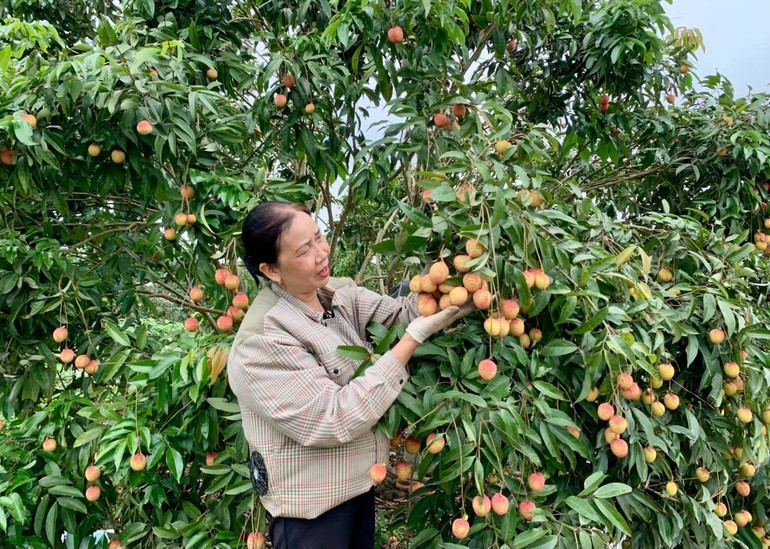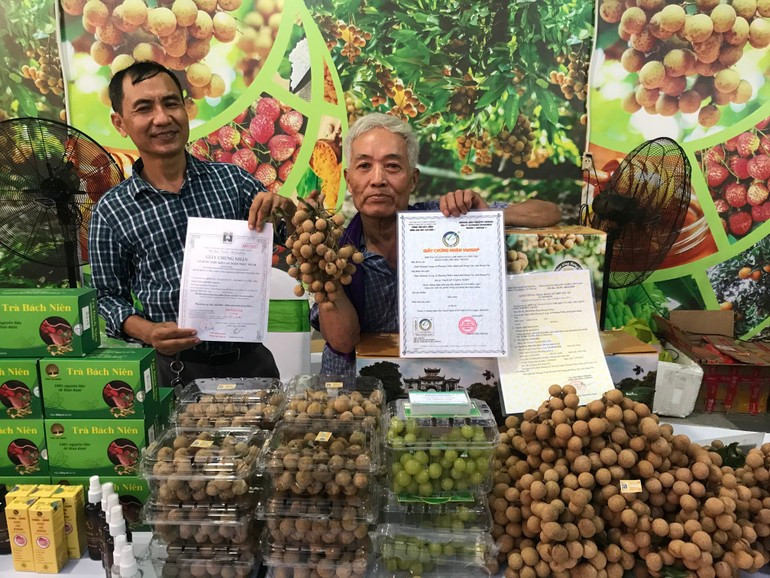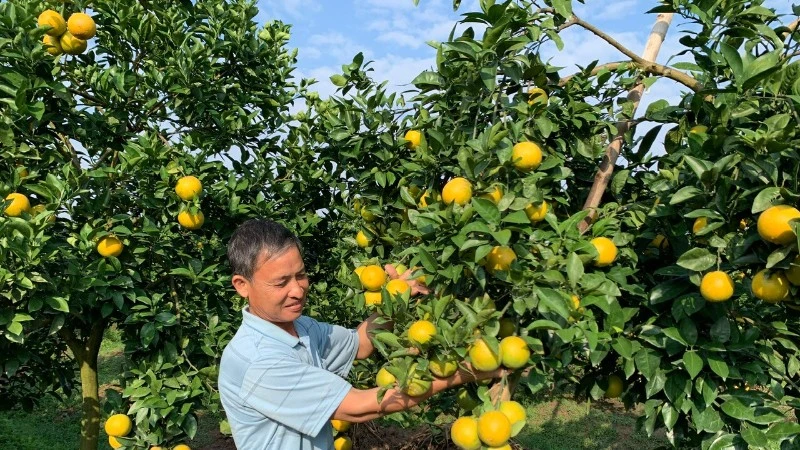Hung Yen Province is encouraging farmers to grow high-value fruit trees following VietGAP, GlobalGAP, and organic standards, thereby forming high-quality, safe fruit-growing zones that meet both domestic and export market demands while ensuring stable and high incomes for producers.
Luong Van Dong, a farmer in Nghia Dan Commune, Hung Yen Province, shared: “In our commune, each household has limited farmland—just over 360 square metres per person. To escape poverty, my family converted 3,600 square metres of rice-farming land into an orange orchard following VietGAP standards. Since then, our annual income from oranges has exceeded 200 million VND, five to six times higher than from rice cultivation.”
Bui Xuan Su from Tan Hung Commune said: “Most farmers in Ne Chau Hamlet, Tan Hung Commune, have switched to longan cultivation. To enhance the value and brand of the longan long, dozens of farming households joined forces to establish the Ne Chau Longan Cooperative, applying advanced agricultural techniques and organic farming methods to ensure clean, safe longan fruits with high economic efficiency. Cooperative members have also encouraged and assisted many other farmers in Tan Hung Commune to adopt organic longan cultivation, forming a sustainable agricultural production area.”
F

Tan Hung Commune, Hung Yen Province, currently has 330 hectares of longans, of which 240 hectares are certified under VietGAP standards. According to Truong Quoc Tran, Chairman of the Tan Hung Commune People’s Committee, “With longan as the key crop, the local government always encourages and prioritises developing OCOP products linked with raw material zones based on VietGAP, organic, and ecological agriculture, ensuring food safety, traceability, environmental protection, and sustainable development. This helps enhance the prestige and value of Hung Yen’s longan fruit.”
In recent years, Hung Yen Province has encouraged farmers to convert low-yield rice land into high-value crops, especially fruit trees, creating a widespread transformation movement across the province.
Many fruit-growing areas have affirmed their sustainable development direction and achieved high economic efficiency. For example, the lychee and longan areas in Tan Hung, Doan Dao, Tong Tran, and Trieu Viet Vuong communes generate average incomes of 300–500 million VND per hectare per year; citrus fruit areas (oranges, tangerines, pomelos) in Nghia Dan, Me So, and Khoai Chau communes yield 350–500 million VND per hectare per year; and banana-growing zones in Chau Ninh, Duc Hop, and Hiep Cuong communes bring in over 300 million VND per hectare annually.

To date, the total area of perennial crops in Hung Yen Province has reached 24,530 hectares, up 2.95% year-on-year compared with 2024. Of this, fruit trees account for 20,946 hectares, up 2.50%, representing 85.39% of the total perennial crop area. Major high-value fruits include bananas (4,928 hectares, over 123,510 tonnes), guavas (1,050 hectares, 15,560 tonnes), oranges (1,896 hectares, 23,762 tonnes), longans (5,879 hectares, over 52,810 tonnes), and lychees (1,928 hectares, 24,475 tonnes).
To expand cultivation areas and improve product quality while gradually meeting export requirements, Hung Yen Province has supported farmers in fruit tree cultivation and care following VietGAP standards.
The provincial Department of Agriculture and Environment has cooperated with local authorities to mobilise orchard owners to shift from traditional farming to safe and organic agriculture. It has also worked with professional units to organise technical training courses on fruit cultivation under VietGAP standards. Farmers have been encouraged to form cooperatives and production groups for fruit cultivation, laying the foundation for establishing production and consumption linkage chains.
The Tien Chau Longan Cooperative in Tan Hung Commune has 24 hectares of longan trees, mainly Hương Chi, T6, and super-sweet varieties. According to Nguyen Van Dien, Chairman of the Cooperative’s Board of Directors, “Currently, 100% of our longan-growing area follows the VietGAP process. The Cooperative acts as a key hub, organising training and technology transfer sessions on VietGAP-compliant longan cultivation for members, and signing cooperation agreements and contracts with several enterprises, retail chains, and supermarkets to distribute our products, bringing high income to farmers.”

The Hung Yen Department of Agriculture and Environment, in collaboration with specialised agencies and commune-level People’s Committees, has selected eligible fruit-growing zones to organise VietGAP certification activities, while providing consultancy and support to establish cooperatives and production groups in these areas. To date, hundreds of fruit-growing models covering thousands of hectares have been certified under VietGAP and provided with label and packaging support. For longans, over 60% of the cultivation area now follows safe, VietGAP, or organic production processes, ensuring quality and safety and creating stable market linkages.
Nguyen Van Trang, Deputy Director of the Hung Yen Department of Agriculture and Environment, stated: “The province continues to encourage farmers to shift crops towards expanding high-value fruit cultivation areas, adopting natural farming methods, using organic and microbial fertilisers, avoiding pesticides, and practising concentrated production according to zoning plans. This not only protects the ecological environment but also increases the value of agricultural products by 1.5 to 2 times compared with mass production, contributing to building the ‘clean’ and organic agricultural brand of Hung Yen.”
















